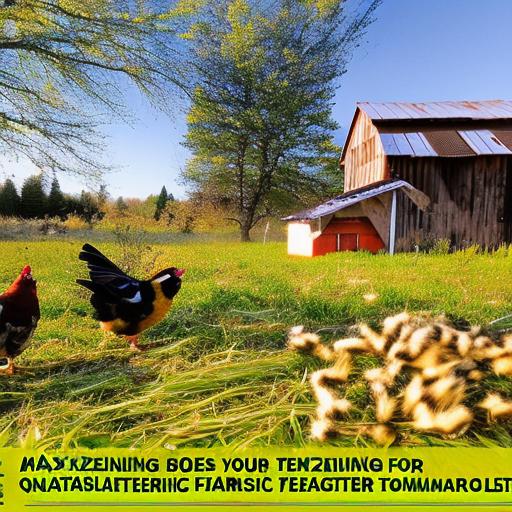Keeping bees and chickens together is a popular trend among backyard homesteaders and urban farmers. It combines the benefits of beekeeping and chicken keeping, providing a sustainable and self-sufficient way of living. Personally, I have been keeping bees and chickens together for several years now, and it has been a rewarding experience. Not only do I enjoy the fresh eggs and honey, but I also appreciate the increased pollination in my garden and the natural pest control that the bees and chickens provide.
Key Takeaways
- Keeping bees and chickens together is a popular trend among backyard farmers.
- Benefits of keeping bees and chickens together include increased pollination, pest control, and egg production.
- Bees and chickens are generally compatible, but precautions should be taken to ensure their safety and well-being.
- Preparing your backyard for bees and chickens involves creating a suitable environment and providing adequate shelter.
- Choosing the right breeds of bees and chickens is important for their compatibility and productivity.
Benefits of Keeping Bees and Chickens Together
One of the main benefits of keeping bees and chickens together is increased pollination for gardens and crops. Bees are excellent pollinators, and having them in close proximity to your plants can significantly improve their yield. Chickens also play a role in pollination by spreading pollen as they forage for insects and plants in the garden. This symbiotic relationship between bees and chickens can lead to healthier plants and a more abundant harvest.
Another benefit is natural pest control. Chickens are known for their ability to eat insects, including pests that can damage crops. By allowing chickens to roam freely in your garden, they can help keep pests under control without the need for harmful pesticides. Bees also contribute to pest control by preying on insects that can harm plants. The combination of bees and chickens creates a natural ecosystem that helps maintain a healthy balance in your backyard.
Fresh eggs and honey are another advantage of keeping bees and chickens together. Chickens provide a steady supply of nutritious eggs, while bees produce delicious honey. Having your own source of eggs and honey not only saves you money but also ensures that you are consuming high-quality, organic products.
Furthermore, keeping bees and chickens together provides educational opportunities for children. It teaches them about the importance of pollinators, the life cycle of bees, and the responsibilities of caring for animals. Children can learn valuable lessons about sustainability, self-sufficiency, and the interconnectedness of nature.
Understanding the Compatibility of Bees and Chickens
Bees and chickens can coexist in the same space without any major issues. Chickens are generally not bothered by bees, and bees are not aggressive towards chickens. However, it is important to provide enough space for both animals to ensure their well-being.
Chickens may occasionally peck at bees if they come too close, but this is usually harmless. Bees, on the other hand, are more focused on their foraging activities and are unlikely to pay much attention to the chickens. As long as there is enough space for both animals to move around freely, they can peacefully coexist.
It is also important to note that bees and chickens have different space requirements. Bees need a beehive where they can build their colonies and store honey. Chickens, on the other hand, need a chicken coop where they can roost, lay eggs, and seek shelter from predators. Providing separate spaces for bees and chickens will ensure that both animals have the necessary resources to thrive.
Preparing Your Backyard for Bees and Chickens
Before getting started with keeping bees and chickens together, it is important to check local regulations and zoning laws. Some areas may have restrictions on beekeeping or chicken keeping, so it is essential to familiarize yourself with the rules in your area.
Once you have confirmed that you can keep bees and chickens in your backyard, you need to create a safe and secure area for the animals. This includes installing fences or barriers to keep predators out and providing adequate shelter from the elements. It is also important to ensure that the area is well-ventilated and has enough space for both the bees and chickens to move around comfortably.
In addition to shelter, you need to provide access to food and water for both the bees and chickens. Bees require a water source nearby, such as a shallow dish filled with water and rocks for them to land on. Chickens need a constant supply of fresh water and a balanced diet that includes grains, vegetables, and protein-rich feed.
Choosing the Right Breeds of Bees and Chickens
When selecting breeds of bees and chickens, there are several factors to consider. For bees, it is important to choose a breed that is well-suited to your climate and has a gentle temperament. Some popular bee breeds include Italian bees, Carniolan bees, and Russian bees.
For chickens, you need to consider factors such as egg production, temperament, and suitability for your climate. Some beginner-friendly chicken breeds include Rhode Island Reds, Sussex, and Plymouth Rocks. These breeds are known for their docile nature, good egg production, and ability to adapt to different climates.
Providing Adequate Shelter for Bees and Chickens

To ensure the well-being of both bees and chickens, it is important to provide them with suitable shelter. For bees, this means having a beehive that is well-insulated and protected from the elements. You can either build your own beehive or purchase one from a reputable supplier. It is important to regularly inspect the beehive for any signs of damage or disease and to keep it clean and well-maintained.
For chickens, a chicken coop is essential. The coop should be spacious enough to accommodate the number of chickens you have and should provide adequate roosting space and nesting boxes. It should also have proper ventilation to prevent the buildup of moisture and ammonia. Regular cleaning of the coop is necessary to maintain good hygiene and prevent the spread of disease.
Feeding and Watering Bees and Chickens Together
Feeding bees and chickens requires different approaches. Bees primarily feed on nectar and pollen from flowers, so it is important to have a variety of flowering plants in your garden to provide them with a diverse food source. You can also supplement their diet with sugar water during times when nectar is scarce.
Chickens, on the other hand, require a balanced diet that includes grains, vegetables, and protein-rich feed. You can provide them with kitchen scraps, such as fruit and vegetable peels, as well as commercial chicken feed. It is important to ensure that the chickens have access to fresh water at all times.
Managing and Maintaining the Beehive and Chicken Coop
Regular maintenance is necessary to keep both the beehive and chicken coop in good condition. For the beehive, this includes inspecting the frames for signs of disease or pests, replacing old comb, and ensuring that the hive is well-ventilated. It is also important to monitor the honey production and harvest it when it is ready.
For the chicken coop, regular cleaning is essential to maintain good hygiene and prevent the spread of disease. This includes removing soiled bedding, cleaning the nesting boxes, and disinfecting the coop periodically. It is also important to check for signs of illness or injury in the chickens and provide appropriate care if needed.
Potential Risks and Challenges of Keeping Bees and Chickens Together
While keeping bees and chickens together can be a rewarding experience, there are some potential risks and challenges to consider. One possible conflict between the animals is that chickens may disturb the bees by scratching around the beehive or pecking at bees that come too close. This can cause stress to the bees and disrupt their foraging activities. To mitigate this risk, it is important to provide enough space for both animals and ensure that they have separate areas for their activities.
There are also health risks associated with keeping bees and chickens together. Bees can sting both humans and chickens, so it is important to take precautions to minimize the risk of stings. This includes wearing protective clothing when working with the bees and providing a safe distance between the beehive and areas where people or chickens spend a lot of time.
Additionally, both bees and chickens can be susceptible to diseases and parasites. Regular monitoring for signs of illness or disease is important to catch any issues early and prevent the spread of infection. It is also important to practice good biosecurity measures, such as keeping the beehive and chicken coop clean and disinfecting equipment regularly.
Is Keeping Bees and Chickens Together Right for You?
Keeping bees and chickens together can be a rewarding and sustainable way of living. The benefits of increased pollination, natural pest control, fresh eggs, and honey, as well as educational opportunities for children, make it an attractive option for many backyard homesteaders and urban farmers.
Before getting started, it is important to consider the compatibility of bees and chickens, prepare your backyard accordingly, choose the right breeds, provide adequate shelter, and ensure proper feeding and watering. Regular maintenance of the beehive and chicken coop is necessary to keep both animals healthy and productive.
While there are potential risks and challenges associated with keeping bees and chickens together, these can be mitigated with proper planning and management. By considering the benefits and challenges outlined in this article and asking yourself the right questions, you can determine if keeping bees and chickens together is the right choice for you. If it seems like a good fit, I encourage you to give it a try and enjoy the many rewards that come with it.
If you’re considering keeping bees and chickens together, you may also be interested in learning about converting a shed into a chicken coop. This article from Poultry Wizard provides valuable insights on how to repurpose a shed to create a comfortable and functional space for your feathered friends. By following the tips and guidelines outlined in the article, you can ensure that your chickens have a safe and secure coop that meets all their needs. To read more about converting a shed into a chicken coop, check out this helpful resource.
FAQs
What are the benefits of keeping bees and chickens together?
Keeping bees and chickens together can have several benefits. Bees can help pollinate plants, which can increase the yield of crops and improve the health of gardens. Chickens can help control pests and weeds, and their manure can be used as fertilizer for plants.
Is it safe to keep bees and chickens together?
Yes, it is generally safe to keep bees and chickens together. Bees and chickens do not typically interact with each other, and both can coexist peacefully in the same area.
What precautions should be taken when keeping bees and chickens together?
It is important to ensure that the bees have a separate entrance to their hive that is not accessible to the chickens. Chickens may be curious and try to investigate the hive, which can disturb the bees and cause them to become agitated. Additionally, it is important to ensure that the chickens do not have access to the sugar water or honey that is used to feed the bees.
Can bees and chickens share the same food and water sources?
No, bees and chickens should not share the same food and water sources. Chickens may eat the sugar water or honey that is used to feed the bees, which can be harmful to their health. Additionally, bees require a specific type of sugar water that is different from what chickens require.
What are some tips for keeping bees and chickens together?
Some tips for keeping bees and chickens together include providing separate entrances for the bees and ensuring that the chickens do not have access to the sugar water or honey that is used to feed the bees. It is also important to monitor the behavior of both the bees and chickens to ensure that they are coexisting peacefully.
Meet Walter, the feathered-friend fanatic of Florida! Nestled in the sunshine state, Walter struts through life with his feathered companions, clucking his way to happiness. With a coop that’s fancier than a five-star hotel, he’s the Don Juan of the chicken world. When he’s not teaching his hens to do the cha-cha, you’ll find him in a heated debate with his prized rooster, Sir Clucks-a-Lot. Walter’s poultry passion is no yolk; he’s the sunny-side-up guy you never knew you needed in your flock of friends!







